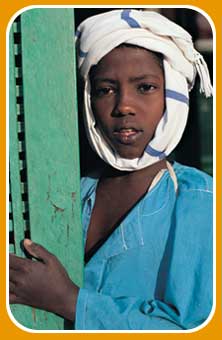| |
Made
in Africa

© Giacomo Pirozzi/Panos
Pictures
A boy in Eritrea,
Africa's newest country
|
Leaders of South Africa, Nigeria, Egypt, Algeria and Senegal
have put together a new plan to halve the number of Africans
living in poverty by 2015. The plan is called the "New
Partnership for Africa's Development", or NePAD for
short. Unlike previous aid programmes, NePAD puts African
countries in the driving seat. |
A new deal
Africa is the only continent where poverty is actually increasing.
As the rest of the world becomes more engaged in world trade
Africa is being left behind, and the average amount of aid
to every African individual has fallen by 40% over the last
decade.
 to find out the top ten recipients of aid in Africa today.
to find out the top ten recipients of aid in Africa today.
NePAD proposes a new
deal between rich countries and African countries to improve
the situation.
Putting their house in
order (known as "good governance") is key to NePAD's
success. There is more chance of reducing poverty in a country
where the government has been elected by its people and continues
to listen to them. But some have questioned whether rich countries
are in a position to lecture Africans about how to run their
countries. Plenty of aid and private investment flows into
other countries that have a poor record on democracy and little
respect for basic human rights. Also, will the rich world
deny aid to poor people that live in a country with a bad
leader?

©Trygve Bolstad/Panos
Pictures
Beira port, Mozambique
|
Extra investment
in Africa could help people produce more and better goods,
creating new jobs and more wealth. Richer countries could
benefit too. New markets could open up in Africa as people
earn and spend more money. |
Support from outside
To meet the rich world's side of the deal, leaders of the
G8 have offered support.
Yet at the July 2002 G8
summit, £650,000 top-up in debt relief was the only
new money promised to Africa, less than the amount spent on
the last five G8 meetings.
On the plus side, the UK government has promised to increase
aid to Africa by 50%, and there is growing momentum to remove
harmful trade barriers and write off more debt. This new partnership
could offer many Africans the chance to escape poverty.
For more information
on NePAD, visit www.nepad.org
and www.datadata.org
|
|





